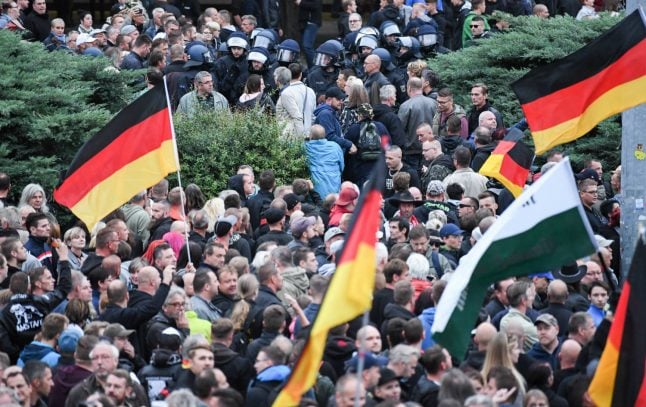The manslaughter trial, which started around 10am, against 23-year-old asylum seeker Alaa S. is being held in another city of the ex-communist Saxony state, Dresden, for security reasons.
Prosecutors charge that the Syrian, together with an Iraqi man still at large but subject to an Interpol warrant, stabbed to death 35-year-old German Daniel Hillig in a late-night street altercation last August.
News of the killing spread within hours on social media and led local far-right football hooligans, extremist martial arts fans and neo-Nazis to march through Chemnitz.
SEE ALSO: German far-right wants to reclaim Chemnitz after fatal stabbing
In scenes that stunned the world, mobs randomly attacked people of foreign appearance and, in follow-up mass rallies, fascist activists openly performed the illegal Hitler salute.
Police braced for more trouble Monday as hundreds of extremists were expected to attend the Chemnitz funeral of a local neo-Nazi.
A year ago, the far-right AfD, Pegida and Pro Chemnitz movements repeatedly marched in Chemnitz while a political fight raged in Berlin about whether the violence amounted to organised “hunts” of ethnic minorities.
In a controversy that shook Chancellor Angela Merkel's coalition government, domestic spy chief Hans-Georg Maaßen, an outspoken critic of her long liberal immigration policy, eventually had to step down.
SEE ALSO: In depth: Is the AfD becoming too extreme?
Late-night fight
Given the political shock waves, and what the court called the “extraordinarily high public interest”, the trial is being held under tight police guard in Dresden, where hearings have been scheduled until October 29th.
Defence lawyers for Alaa S. had unsuccessfully requested it be held outside Saxony state, which is the birthplace of Pegida, short for Patriotic Europeans Against the Islamisation of the Occident, and the heartland of the anti-immigration AfD party.
The defence team also argue that the case against their client, a trained hairdresser, is weak, as police reportedly lack DNA evidence, fingerprints or other forensic proof.
Relying in large part on witness testimony, prosecutors say the argument started near a kebab stand around 3am on August 27th after a town festival.
The fugitive Iraqi, 22-year-old Farhad R.A., was first to confront Hillig, a carpenter with German-Cuban roots, say prosecutors.
Both Arab men then allegedly stabbed Hillig and another man. Hillig died of wounds to the heart and lung, while the second man was badly wounded.
Alaa S. was detained nearby soon after together with another Iraqi man, Yousif I.A., who was however released three weeks later for lack of evidence.
If found guilty, the Syrian suspect, who denies the crime, faces a jail term of up to 15 years.
'Enrage people'
If the killing was shocking, it was the subsequent riots that threw a harsh spotlight on Chemnitz, which has long had an extremist subculture.
SEE ALSO: Racist crime rises sharply in state of Saxony
In the 1990s the city was an early hideout for the National Socialist Underground (NSU), a militant neo-Nazi cell of three only uncovered in 2011 that murdered 10 people.
Last October police arrested eight men accused of having formed the far-right militant group “Revolution Chemnitz”.
And earlier this month, fans of the fourth-tier football club Chemnitzer FC paid tribute to a recently deceased figure of the local far-right scene, Thomas Haller.
During a minute's silence the stadium video screen showed a picture of Haller, the former co-founder of a group called “HooNaRa” (Hooligans-Nazis-Racists), who had for years provided security for the club.
As the trial is set to start, Chemnitz remains on edge, with a large group of extremist hooligans expected at the funeral of Haller on Monday.
The head of Pro Chemnitz, Martin Kohlmann, told the taz newspaper that if the trial ends with an acquittal later this year, “that would very much enrage people”.
By Andrea Hentschel and David Courbet




 Please whitelist us to continue reading.
Please whitelist us to continue reading.
Member comments